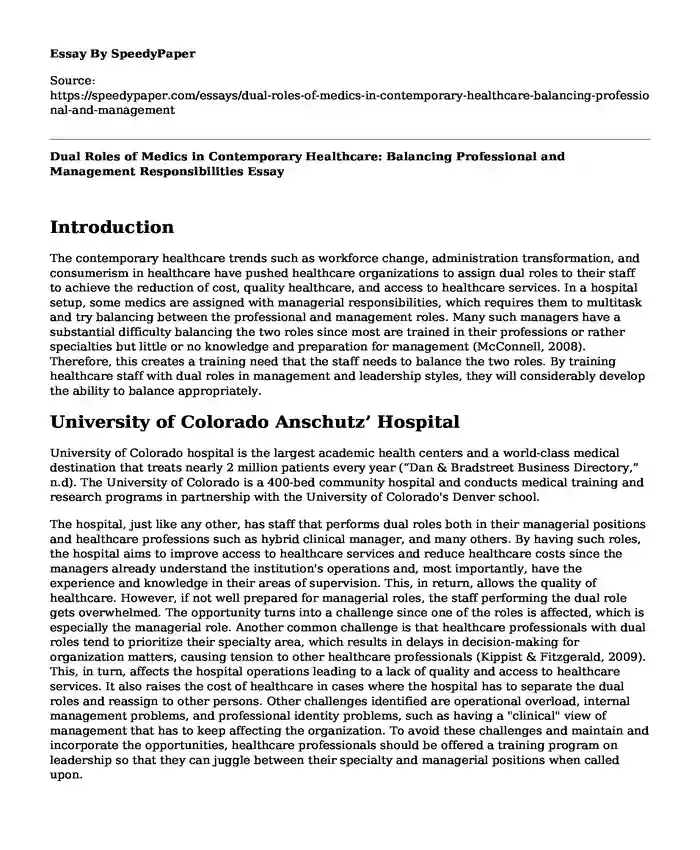
| Type of paper: | Essay |
| Categories: | Management Health and Social Care Healthcare Healthcare policy |
| Pages: | 3 |
| Wordcount: | 815 words |
Introduction
The contemporary healthcare trends such as workforce change, administration transformation, and consumerism in healthcare have pushed healthcare organizations to assign dual roles to their staff to achieve the reduction of cost, quality healthcare, and access to healthcare services. In a hospital setup, some medics are assigned with managerial responsibilities, which requires them to multitask and try balancing between the professional and management roles. Many such managers have a substantial difficulty balancing the two roles since most are trained in their professions or rather specialties but little or no knowledge and preparation for management (McConnell, 2008). Therefore, this creates a training need that the staff needs to balance the two roles. By training healthcare staff with dual roles in management and leadership styles, they will considerably develop the ability to balance appropriately.
University of Colorado Anschutz’ Hospital
University of Colorado hospital is the largest academic health centers and a world-class medical destination that treats nearly 2 million patients every year (“Dan & Bradstreet Business Directory,” n.d). The University of Colorado is a 400-bed community hospital and conducts medical training and research programs in partnership with the University of Colorado's Denver school.
The hospital, just like any other, has staff that performs dual roles both in their managerial positions and healthcare professions such as hybrid clinical manager, and many others. By having such roles, the hospital aims to improve access to healthcare services and reduce healthcare costs since the managers already understand the institution's operations and, most importantly, have the experience and knowledge in their areas of supervision. This, in return, allows the quality of healthcare. However, if not well prepared for managerial roles, the staff performing the dual role gets overwhelmed. The opportunity turns into a challenge since one of the roles is affected, which is especially the managerial role. Another common challenge is that healthcare professionals with dual roles tend to prioritize their specialty area, which results in delays in decision-making for organization matters, causing tension to other healthcare professionals (Kippist & Fitzgerald, 2009). This, in turn, affects the hospital operations leading to a lack of quality and access to healthcare services. It also raises the cost of healthcare in cases where the hospital has to separate the dual roles and reassign to other persons. Other challenges identified are operational overload, internal management problems, and professional identity problems, such as having a "clinical" view of management that has to keep affecting the organization. To avoid these challenges and maintain and incorporate the opportunities, healthcare professionals should be offered a training program on leadership so that they can juggle between their specialty and managerial positions when called upon.
Training
The training will involve both healthcare staff with dual roles and those who do not have dual roles. This aims to prepare them to take up managerial positions when they come up and perform well in both roles.
At the end of the training, the staff will be expected to know leadership styles. For the longest, leadership style has been a key element for the quality of healthcare (Sfantou et al., 2017). Further, the healthcare professionals in the medical University will be expected to effectively take up the dual roles and effectively strike a balance between the two roles. Different leadership styles are needed for different scenarios in the organization set up (Xu, 2017). Therefore, the staff will also know which approach and leadership style is most effective in a given scenario to achieve organizational goals.
The training will be significantly beneficial to the University of Colorado Hospital. The training program's impact will be immeasurable given that the healthcare organization incessantly search for efficiencies and push for cost reduction, which will be equally achieved if the staff undergo the training.
Conclusion
With contemporary healthcare trends such as workforce change, administration transformation, and consumerism in healthcare, many healthcare organizations focus on reducing cost, quality healthcare, and access to healthcare services. This is only realizable through the provision of training programs to the healthcare staff.
References
Dan & Bradstreet Business Directory. (N.d). University of Colorado Hospital Authority. Dan & Bradstreet Business Directory. https://www.dnb.com/business-directory/company-profiles.university_of_colorado_hospital_authority.ca9ad2d1d6ae27e1139e0300e47156b0.html
Kippist, L., & Fitzgerald, A. (2009). Organizational, professional conflict, and hybrid clinician managers’: the effects of dual roles in Australian healthcare organisations. The Journal of Health Organization and Management, 23(6), 642-655.
McConnell, C. R. (2008). The health care professional as a manager: balancing two important roles. The Health Care Manager, 27(3), 277-284.
Sfantou, D. F., Laliotis, A., Patelarou, A. E., Sifaki-Pistolla, D., Matalliotakis, M., & Patelarou, E. (2017, December). The Importance of leadership style towards the quality of care measures in the healthcare settings: systematic review. In Healthcare (Vol. 5, No. 4, p. 73). The Multidisciplinary Digital Publishing Institute.
Xu, J. (2017, December 4). Leadership Theory in Clinical Practice. Chinese Nursing Research. (Vol 4, No 4 p 155-157) https://doi.org/10.1016/j.cnre.2017.10.001
Cite this page
Dual Roles of Medics in Contemporary Healthcare: Balancing Professional and Management Responsibilities. (2023, Oct 15). Retrieved from https://speedypaper.com/essays/dual-roles-of-medics-in-contemporary-healthcare-balancing-professional-and-management
Request Removal
If you are the original author of this essay and no longer wish to have it published on the SpeedyPaper website, please click below to request its removal:
- Reflection Paper Sample about the Plague of Athens 427-430BC
- Essay Sample Describing the Effect of Vegetarian Diet on Weight Reduction
- Essay Example on Perspectives on Argument About Spread of Coronavirus Disease
- Essay Sample on The Effect of Restraints on Psychiatric Patients Experience During Hospitalization
- Caring for Patients Holistically - The Essence of Nursing - Paper Example
- Essay on Treating Loneliness in Nursing Residents: 7 Sept 2020
- Global Challenges: COVID-19, Patents, and Transnational Coordination - Paper Example
Popular categories




